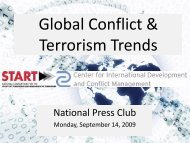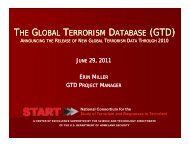Scientific Underpinnings of - START - National Consortium for the ...
Scientific Underpinnings of - START - National Consortium for the ...
Scientific Underpinnings of - START - National Consortium for the ...
Create successful ePaper yourself
Turn your PDF publications into a flip-book with our unique Google optimized e-Paper software.
These trends <strong>the</strong>re<strong>for</strong>e require action in two major respects: first in regard to <strong>the</strong> major<br />
international institutions <strong>for</strong> military, financial, and diplomatic action, and second in regard to<br />
policies <strong>for</strong> international migration and law en<strong>for</strong>cement.<br />
At this writing, <strong>the</strong> G-20 is replacing <strong>the</strong> G-8 as <strong>the</strong> international assembly that will arbitrate and<br />
coordinate global financial policies; that is <strong>the</strong> natural direction <strong>for</strong> future revision <strong>of</strong> <strong>the</strong> global<br />
institutional architecture. The global institutions established at <strong>the</strong> end <strong>of</strong> <strong>the</strong> second world war<br />
were designed to perpetuate <strong>the</strong> power <strong>of</strong> that war’s victors: The United States, France, Britain,<br />
Russia, and China (first <strong>the</strong> Republic on Taiwan, now <strong>the</strong> People’s Republic on <strong>the</strong> mainland).<br />
The World Bank, <strong>the</strong> International Monetary Fund, and <strong>of</strong> course <strong>the</strong> United Nations retain a<br />
structure giving <strong>the</strong>se countries a dominant role, yet in <strong>the</strong> near future, a realistic appraisal <strong>of</strong><br />
global economic and manpower strength would show a more diverse and more balanced roster:<br />
<strong>the</strong> United States, Russia, and China to be sure, but also <strong>the</strong> European Union as a whole (with<br />
Germany, Poland, Spain, and Italy as key players), India, Brazil, Indonesia, Pakistan, Turkey,<br />
Nigeria, South Africa, Mexico, and perhaps Iran, Ukraine, Vietnam, and o<strong>the</strong>rs. Given <strong>the</strong> rapid<br />
shifts in economic and population growth expected in <strong>the</strong> years ahead, it seems it would be wise<br />
if international institutions had a more flexible leadership structure. Ra<strong>the</strong>r than a fixed set <strong>of</strong><br />
countries filling key roles or staffing major institutions, it might be wise to stipulate that any<br />
country, or any regional group <strong>of</strong> countries that establishes a common leadership or<br />
representative faculty, which comprises 4% or more <strong>of</strong> <strong>the</strong> world’s population or 4% or more <strong>of</strong><br />
<strong>the</strong> world’s economy should have a seat at <strong>the</strong> leader’s table.<br />
While such trends seem already underway in regard to global finance, a shift in <strong>the</strong> world’s<br />
military alignments seems to be required, as well. If <strong>the</strong> major conflicts <strong>of</strong> <strong>the</strong> future are not<br />
likely to be between NATO and Russia, or between Australia and Indonesia, or between Bolivia<br />
and Brazil—in short, less likely to be international than domestic or regional conflicts brought on<br />
by state failures—<strong>the</strong>n <strong>the</strong> major international military alliances need to have <strong>the</strong> capacity to<br />
intervene <strong>for</strong> humanitarian purposes and to provide order in failed states and regions affected by<br />
<strong>the</strong>m. That is a requirement <strong>for</strong> relatively low-tech but trained military and civilian manpower<br />
that can be deployed in various regions <strong>of</strong> <strong>the</strong> world at an af<strong>for</strong>dable cost. This requirement<br />
simply cannot be supplied by NATO <strong>for</strong> <strong>the</strong> extended future, or not as NATO is currently<br />
configured. This means it will be necessary ei<strong>the</strong>r to expand NATO itself or replace it with a new<br />
global military alliance (with similar shared training and equipment to allow coordinated joint<br />
functions) geared to moving large numbers <strong>of</strong> military and civilian units into unstable areas and<br />
supporting <strong>the</strong>m <strong>the</strong>re. This will clearly require a partnership that spans regions and that includes<br />
both countries with large numbers <strong>of</strong> moderate-cost military and civilians available, and<br />
countries with logistic and financial resources to support <strong>the</strong>m. More explicitly, this means<br />
incorporating countries such as Brazil, Indonesia, and possibly Pakistan, <strong>the</strong> Philippines, South<br />
Africa, and o<strong>the</strong>rs into a joint structure. Right now, <strong>the</strong> United Nations’ blue helmets draw on<br />
such countries precisely <strong>for</strong> such stabilization and peace-keeping missions. However, <strong>the</strong>ir<br />
resources are limited, and <strong>the</strong>ir joint training and coordination a work-in-progress. Moreover,<br />
<strong>the</strong>y have <strong>the</strong> anomalous character <strong>of</strong> being deployed (and <strong>of</strong>ten commanded) by <strong>the</strong> decisions <strong>of</strong><br />
<strong>the</strong> UN Security Council, which is dominated by <strong>the</strong> handful <strong>of</strong> WWII dominant nations but is<br />
manned mainly by troops from poorer countries who are <strong>of</strong>ten unrepresented on <strong>the</strong> Security<br />
Council. Given <strong>the</strong> likely prevalence <strong>of</strong> such missions in <strong>the</strong> future, driven by growing numbers<br />
<strong>of</strong> young men and urban expansion in developing economies affected by climate change and<br />
economic change, it would seem prudent to prepare <strong>the</strong> most effective <strong>for</strong>ces <strong>for</strong> such missions<br />
by pooling <strong>the</strong> resources <strong>of</strong> diverse nations.<br />
41





